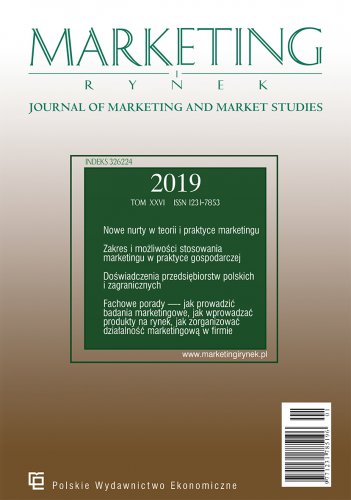Evaluation of intelligent chatbot implementation impact on human resources management
Due to broadening of their capabilities, chatbots are rapidly gaining popularity on software market. Artificial Intelligence is more often implemented as a part of virtual assistants, which opens a path towards more complex task solving. Enterprises, which benefit from such software solutions, observe positive effect on wide variety of processes inside the company. Based on documented implementation cases, this paper aims to answer the question: what are the results of intelligent chatbot implementation on companies' human resources management?
References
Business Insider Intelligence. (2016). 80% of businesses want chatbots by 2020. Business Insider. Pozyskano z https://www.businessinsider.com/80-of-businesses-want-chatbots-by-2020-2016-12?IR=T
Efron, L. (2016). How A.I. Is About To Disrupt Corporate Recruiting. Forbes [online]. Pozyskano z https://www.forbes.com/sites/louisefron/2016/07/12/how-a-i-is-about-to-disrupt-corporate-recruiting/#b52b67b3ba22
Fatima, A., Fatima, N., Parveen, N., Murthy, R. i Reddy C.K.K. (2019). Survey on web based conversational chatbot design. Journal of Applied Science and Computations, VI, 477–488. Pozyskano z http://www.j-asc.com/gallery/42-sp3-jan-2019.pdf
Freeman, D. (2016), Next IT Intelligent Assistant for Amtrak Wins Global Award for Best Consumer Application of AI, Business Wire [online]. Pozyskano z https://www.businesswire.com/news/home/20160120005909/en/Intelligent-Assistant-Amtrak-Wins-Global-Award-Consumer
Gartner. (2018). Analysts Present Top Predictions for Customer Experience Leaders at the Gartner Customer Experience Summit. Tokyo: Gartner. https://doi.org/10.1016/j.annals.2006.10.005
Gartner. (2019). Future of work: How HR can prepare for tomorrow’s workforce. Gartner.
Hodges, A. (2009). Alan Turing and the Turing Test. W: R. Epstein, G. Roberts i G. Beber (red.), Parsing the Turing Test Philosophical and Methodological Issues in the Quest for the Thinking Computer (s. 123–22). Springer. https://doi.org/10.1007/978-1-4020-6710-5_2
Jongerius, C. (2018). Quantifying Chatbot Performance by usingData Analytics. Utrecht University. Pozyskano z https://research.infosupport.com/wp-content/uploads/2019/05/Quantifying-Chatbot-Performance-by-using-Data-Analytics-Master-Thesis-Cas-Jongerius.pdf
Lausen, S. (1997). Usability Engineering in Industrial Practice. W: Human-Computer Interaction INTERACT ’97 (s.15–22). IFIP TC13 International Conference on Human-Computer Interaction, Sydney. https://doi.org/10.1007/978-0-387-35175-9_4
Luo, X., Tong, S., Fang, Z. i Qu, Z. (2019). Machines versus Humans: The Impact of AI Chatbot Disclosure on Customer Purchases. Temple University. https://doi.org/10.1287/mksc.2019.1192
Mantzaris, K. i Myloni, B. (2018). Human Resources and Workplaces of Tomorrow. Referat wygłoszony na: International Conference on Business and Economics. Hellenic Open University. Pozyskano z https://www.researchgate.net/profile/Konstantinos_Mantzaris/publication/325146454_Human_Resources_and_Workplaces_of_Tomorrow/links/5c2e169a92851c22a358150f/Human-Resources-and-Workplaces-of-Tomorrow.pdf
Market Research Future. (2019). Chatbots Market Research Report – Global Forecast 2023. Market Research Future.
Mindshare. (2016). Humanity in the machine. Mindshare UK. Pozyskano z https://www.mindshareworld.com/sites/default/files/MINDSHARE_HUDDLE_HUMANITY_MACHINE_2016_0.pdf
Peras, D. (2018). Chatbot evaluation metrics: review paper. W: R. Veselica, G. Dukic i K. Hammes (red.), Economic and social development (s. 89–97). Varazdin Development and Entrepreneurship Agency. Pozyskano z: https://www.researchgate.net/profile/Tomasz_Studzieniecki/publication/329717703_Wealth_or_happiness_of_the_European_union-_the_dilemma_of_the_normative_economics/links/5c17f64892851c39ebf51ea3/Wealth-or-happiness-of-the-European-union-the-dilemma-of-the-normative-economics.pdf#page=89
Schwab, K. (2016). Industry 4.0 – networked, adaptive production. Aachen, Niemcy: Frauhofer Institute for Production Technology. Pozskano z https://www.semanticscholar.org/paper/The-Fourth-Industrial-Revolution-Schwab/b2add02d066a1b91810284e549d80fc71df357d3
Statista. (2019a). Leading social media platforms used by marketers worldwide. Statista. https://doi.org/10.5260/cca.199318
Statista. (2019b). Most popular social networks worldwide. Statista. Pozyskano z https://doi.org/10.5260/cca.199318
Walker, M., Litman, D., Kamm C. i in. (1997). PARADISE: A Framework for Evaluating Spoken Dialogue Agents. Proceedings of the 35th Annual Meeting of the Association for Computational Linguistics. https://doi.org/10.3115/976909.979652

